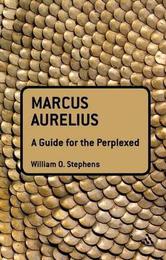
|
Marcus Aurelius: A Guide for the Perplexed
Paperback / softback
Main Details
Description
This book is a clear and concise introduction to the Roman Emperor Marcus Aurelius Antoninus. His one major surviving work, often titled 'meditations' but literally translated simply as 'to himself', is a series of short, sometimes enigmatic reflections divided seemingly arbitrarily into twelve books and apparently written only to be read by him. For these reasons Marcus is a particularly difficult thinker to understand. His musings, framed as 'notes to self' or 'memoranda', are the exhortations of an earnest, conscientious Stoic burdened with the onerous responsibilities of ruling an entire, enormous empire. William O. Stephens lucidly sketches Marcus Aurelius' upbringing, family relations, rise to the throne, military campaigns, and legacy, situating his philosophy amidst his life and times, explicating the factors shaping Marcus' philosophy, and clarifying key themes in the Memoranda. Specifically designed to meet the needs of students seeking a thorough understanding of this key figure and his major work, Marcus Aurelius: A Guide for the Perplexed is the ideal guide for understanding this Stoic author - the only philosopher who was also an emperor.
Author Biography
William O. Stephens is a Professor of Philosophy and of Classical & Near Eastern Studies at Creighton University, Nebraska, USA.
ReviewsA fine addition [to the Guides for the Perplexed series]. Stephens has written widely on Stoic ethics, and his writing has a lucid and pleasant style . . . a reliable and helpful guide. -- Rogier L. van der Wal, Vrije Universiteit Amsterdam * Bryn Mawr Classical Review * Marcus's Meditations are a source of inspiration and curiosity. Why did Marcus write the book? ... And what is the lasting significance and impact of the text? William O. Stephens's Marcus Aurelius: A Guide for the Perplexed does an admirable job of answering these questions ... Among the book's virtues is the fact that it is not a rambling exercise in historical erudition or critique. It is primarily an exegesis of the Meditations. Its other primary virtue is found in Stephens's passionate prose, which effectively channels the spirit of Marcus and ancient Stoicism. -- Andrew Fiala * Ancient Philosophy *
|